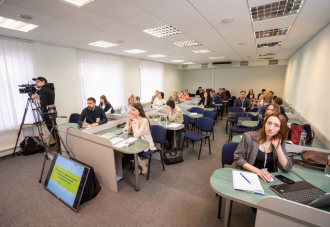Overcoming lockout, overcoming distances between countries: geographical, postal, and bureaucratic. And now overcoming the challenges of war.
This is how NGO Agency “Damo Radu” works, a non-governmental organization from Lviv that helps Ukrainians who have returned from work in Italy to get pensions they are entitled to under the Italian law.
Even when it comes to small payments, this money can be critical for some. For example, for people like Ms. Dariia.
Ms. Dariia (name changed) comes from a small village near Lviv. She is 79 years old now. When she was 61, she went to Italy to earn money for her family. After eight years as a caregiver, she had to come back: she fell ill and couldn’t work anymore. But no one was expecting her in Ukraine either: Her daughter and son-in-law wouldn’t let her live in her own house anymore.
Sick, at her friends’ house, where there was not as much as heating, she was trying to survive on her minimum Ukrainian pension.
Assistance with pension in Ukraine has become very helpful for Ms. Dariia. After all the documents were drawn up, she began receiving about EUR 70 a month in pension payments from the Italian budget.
In addition, she received almost EUR 4,000 from Italy for the period from retirement age (67 years – re-emigrant retirement age) to the time when the Italian pension fund assigned pension.
Ms. Dariia is a typical representative of the poorest categories of re-emigrants. The money she receives is mainly spent on food and medicines. The total amount of EUR 4,000 was sufficient for her to buy a small house in the village.
The main condition for receiving a pension for re-emigrants is return to one’s homeland. This is a well-thought-out international economic policy.
After all, when elderly migrants return home, the pressure on Italy’s social security system is reduced.
At the same time, for Ukraine, this money is an important factor in economic development: According to the Damo Radu Agency, the amount of migrants’ wire transfers exceeds the amount of foreign direct investment in Ukraine.
“Our key service is the application for pensions for the time of work in Italy on the basis of Italian legislation,” says Yaryna Khomtsii, director of NGO Agency “Damo Radu”.
According to Ms. Yaryna, this is quite a difficult task.
Back in 2020, as part of Mentorship Program 1.0, Damo Radu Agency, with the support of the Legal Hundred mentor organization, developed an interstate mechanism for the payment of pensions for time worked in countries with which there are no international treaties with Ukraine (in particular with Italy) in the field of social protection.). This treaty should simplify certain procedures.
Organizations developed a three-year plan to implement the idea. To draw attention to the problem of social security of migrants, an international conference was held with the participation of experts from various migrant countries.
One of the partners, the National Institute for Strategic Studies under the President of Ukraine, developed and sent its proposals to the relevant Ukrainian authorities.
The attention to the needs of Ukraine and Ukrainian migrants in the world increased during the war. Therefore, Damo Radu Agency is intensifying its efforts to develop an intergovernmental mechanism for the payment of pensions to migrants together with its partners.
War affects pension for re-emigrants
The war also affected the daily work of the Damo Radu Agency. The process of application for pensions for the time worked in Italy became more complicated: Technical difficulties have been added to the issue of physical security, as the process involves both the work of the post office and the work of registers.
After the start of a full-scale Russian invasion, Ukrainian registers were closed. It was impossible to obtain document important for the application for pensions – a certificate of residence registration – and certify it for submission abroad.
“I talked to Administrative Services Centers (ASCs), now they are slowly starting to issue these certificates,” says Ms. Yaryna. “Apostille registers are resuming their work. This is important because certificates must be certified.”
Application for a pension in Italy requires paperwork, which has also become a challenge: “The war affects institutions and physically puts our clients at risk: You have to get documents and send them to us, and we have to get and process the documents here.”
And that’s not it. According to Yaryna Khomtsii, a significant problem for the beneficiaries of one of the types of Italian pensions is that its beneficiaries do not have the right to go anywhere and cannot return to Italy.
“This is the pension of a re-emigrant, a person who has returned to Ukraine forever,” says Ms. Yaryna. “And one of the proposals of our partners is that the force majeure in which Ukrainians find themselves would override this ban.”
Another important issue is the receipt of payments. To simplify banking procedures, most accruals were made not to cards, but to current accounts.
“When accepting application for pension, we asked them: Please open a current account, you will be able to withdraw your money at the cashier’s desk. They now have a current account, which makes it difficult to receive payments outside of Ukraine. That’s why our partners are also working to make it possible to receive funds abroad.”
In addition, it should be borne in mind that Ukrainian re-emigrants did not just return to Italy – they were forced to go to different countries.
Italian partners develop proposals for additional support
ACLI Association through Patronato ACLI, the only one among Italian patronates present in Ukraine and cooperating with the NGO Agency Damo Radu, has in recent years met and helped thousands of Ukrainians who immigrated to Italy, some of whom later returned to their homeland.
Now, in wartime, they have approached the Italian government with proposals for the reception and regular stay of Ukrainians, promotion of migrant rights and support for integration processes.
Among others, the below is discussed:
- Granting temporary residence permits to those who left Ukraine before February 24 due to the escalation of the conflict in Donbas and growing military tensions on the Russian-Ukrainian border;
- Extending the residence permits of Ukrainian citizens, coordinating them with the expiration of the temporary permit (valid until March 4, 2023) – to avoid situation in which these people will be forced to return to the country that is still at war;
- Continuing to provide re-emigrant pensions to those who receive these pensions but are forced to leave Ukraine as a result of hostilities, and allowing them to withdraw their pensions at the Italian post office and through other foreign banks;
- Concluding a social insurance treaty between Italy and Ukraine that would allow Italian and Ukrainian insurance premiums to be pooled, avoiding the situation of being forced to return home to receive pension.
Will Ukrainians receive re-emigrant pensions in 2022?
On February 7, the next proof-of-life campaign began. For Ukraine, it should last until June 7.
Most of the clients of the Damo Radu Agency are from Western Ukraine: Lviv, Frankivsk, Ternopil Regions, the city of Chernivtsi. “But we have about 30% of residents from the Center, South and East of Ukraine, in particular from Kyiv, Odesa, Mykolaiv, Poltava,” says Yaryna Khomtsii.
Re-emigrant pension beneficiaries must now receive a letter from Citibank UK, confirm the fact of life through certified witnesses (in Ukraine they are embassy representatives and notaries) and physically send it to the bank in the UK – according to the procedure.
“It is difficult to accomplish even in peacetime. During the coronavirus pandemic, a lot of people didn’t get their letters, and we saw that 800 of our clients didn’t confirm the fact of life. We spent six months helping people do that,” says Ms. Yaryna.
According to her, people have already started asking the organization what to do if the letters have already been received.
For the system to work, notaries also need to work, because the document can be certified by a notary or an embassy. “Notaries work,” says Ms. Yaryna, “but it all has to be very carefully explained to people so that they don’t rush and send the letter at a time when the post office doesn’t work and it won’t reach the address.”
Therefore, on their website, Agency representatives asked their clients to take their time: “We believe that when we resume service, we will have time to help everyone. Therefore, in the meantime, we advise you to keep your Citibank letters for now.”
Support in Italy
“Patronato ACLI is exactly the kind of organization that is proactive in responding to the situation in Ukraine,” says Yaryna Khomtsii. “Offices of our partners all over Italy are open for counseling Ukrainian migrants who arrived in Italy. Patronato ACLI also makes public statements in support of Ukraine and has asked the Italian government to simplify admission procedures for those who came to Italy to visit their relatives.”
Representatives of the Damo Radu Agency believe that these statements influence the Italian government’s policy in support of Ukraine.
And as soon as the government institutions start working, the Damo Radu Agency will resume full-fledged work to make sure Ukrainians continue to receive their payments.
Useful links
- Website of the Damo Radu Agency, where you can find information on pensions from the Italian government: https://damoradu.org/uk/(stay tuned for updates).
- If you are going or have already arrived in Italy, for example, in Lazio.
- Citizens of Ukraine can travel free of charge within the territory of Italy for 5 days from the moment of entering Italy.
- How can immigrants learn Italian? Tips.
- Human Trafficking: Important Information for DPs.



